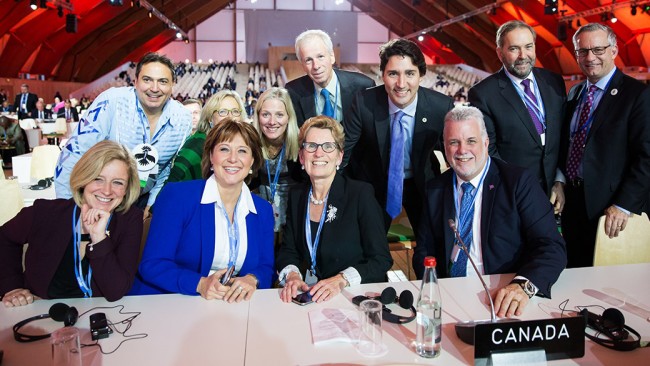
“I look forward to working with the Premiers on combatting climate change and moving toward a greener, more sustainable Canadian economy better positioned to compete globally in the areas of clean knowledge and technologies.” – Rt. Hon. Justin Trudeau, Prime Minister of Canada.
So it begins.
The Prime Minister will sit down with Premiers to talk climate change in Vancouver on March 3rd, 2016, fulfilling a commitment he made when the December 2015 CoP21 meeting concluded in Paris.
The Prime Minister has stated his intention to move an agenda forward consisting of; “reducing greenhouse gas emissions, including through carbon pricing”; creating “a climate resilient economy”, and making “investments in public transit, green infrastructure and clean technologies”.
The biggest challenge for the leaders meeting in Vancouver, however, is Canada’s commitment to reduce GHG emissions by 30% from 2005 levels. In achieving this, Mr. Trudeau faces the ghost of Kyoto past, Mr. Chretien’s commitment to reduce Canada’s GHG emissions by 6% from 1990 levels by 2012. – We never came close.
Canada now must emit 30% fewer GHGs than we were producing 11 years ago. But, given our reputation as an environmental truant in the years since 1997, we have a lot of work to do. We failed to meet the Kyoto target. Our emissions actually increased by more than 24% before the Harper Government took us out of Kyoto. By 2012, Canadian emissions had increased in every province except Quebec.
If public utterances are any indication, Mr. Trudeau is facing an uphill battle in Vancouver – a veritable brick Wall.
The Saskatchewan Premier will test Mr. Trudeau’s skills of diplomacy by swimming against even the limited current of commitment from other provinces to meet Canada’s international GHG reduction obligations.
Mr. Wall isn’t the only problem premier. Alberta’s Premier Notley has done a brilliant job of wearing sheep’s clothing while inserting a policy placeholder allowing for substantial increases in its emission profile to accommodate expansion of its oil sands. It remains to be seen whether Alberta’s announced move away from coal will result in a net reduction of that province’s GHG emissions. If it doesn’t, something has to give…
The Paris agreement means that provinces that have emissions-rich development, like Alberta and Saskatchewan will have to either scale back that development; adopt expensive emissions mitigation like Carbon Capture; or participate in an emissions trading scheme, buying credit from provinces who have successfully reduced their carbon footprint and have spare credit to offset the poor performers.
…Or they can do what Brad Wall seems to be doing, a lot of howling aimed at changing the channel.
By contrast the less antagonistic approach of Premier Notley of Alberta holds some promise that Wall’s destructive intransigence will not prevail and if we can’t solve the puzzle we will at least continue to meet…and talk… and eventually solve this thing.
That is if Notley doesn’t get sucked into Wall’s phoney pipeline war that threatens to sideline the climate discussion permanently.
One thing is clear. We can no longer paper over the contradiction of some provinces making a halfway reasonable effort to deal with climate change and others who are resolutely marching in the opposite direction.
